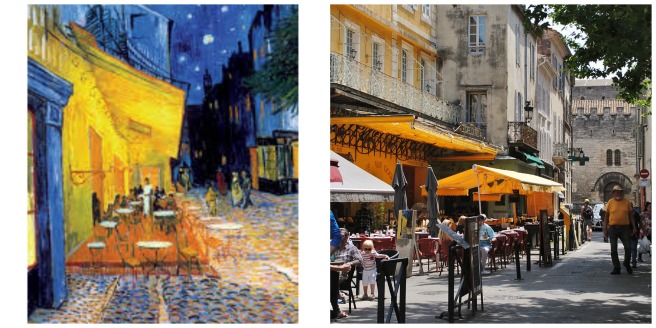Art in the Autumn #2 — via Daily Prompt: Facade

I woke up this morning to the news that two Van Gogh paintings, stolen 14 years ago, have been found in Italy. (The news blurb can be found here.) After 14 years, there was no expectation that these paintings would ever come back home to the Van Gogh museum in Amsterdam, and it’s fair to say that the museum director was absolutely giddy with excitement when the news broke: “‘The paintings have been found! That I would be able to ever pronounce these words is something I had no longer dared to hope for,'” said museum director Axel Ruger. ‘We have been waiting for this moment for 14 years.'”
If Mr. Ruger had a fatted calf at hand, or if artwork was inclined to dine, for that matter, I’m sure a great feast would be in the works. In fact, I imagine that a great feast and homecoming celebration are in the works anyhow–centering around the returning art, but fattening up the people who are ecstatic to welcome it. How could you not celebrate the return of two Van Gogh paintings? At the very least, you must revel in the return of the property: reportedly worth over 30 million dollars. But beyond the quantifying, there is the qualifying value of Van Gogh. The beauty, the daring, and . . . that other thing about Van Gogh. That thing, that hard to explain thing. 
Is it me, or is there something radically personal about Van Gogh and his art? In every way, he and his art are prodigal. And because of that, they are life. Your life, my life, each moment of life that is extravagant. The simple beauty of the crisp starry night that we had here in Florida last night– so mundane, I suppose, but so vibrant when you actually look up to notice it (and though the sky is not swirling, the breeze on your cheek gives the world that effect, if only you will notice). 
Or the moment when you look in the mirror and actually see yourself today, as you are and without judgment, erasing the 20-some years of what you thought you looked like (and maybe what you still look like in the right light, with your hair done just so, and your makeup expertly in place)– but at 50 years old, in the stark morning light, before you have raised your facade to meet the world, you find new movement to your face and new tones in your skin. The jowls are sliding here, the eyes crinkle there, the furrows are surely evolving from expression lines to permanent fixtures. You see the shade of your ancestors in your own face– and you recognize the movement and energy, and changing moods, of Van Gogh’s own self portraits. (Some people try to uncover a descent into madness in his shifting self portraits– I see only lighting, only mood, only the natural movements and shifts of life. Changeable; life is nothing if not changeable.)
On the prodigality of his art, it is interesting to note that the two works that are returning home are early works– a traditional seascape and landscape with church. They are lovely, but don’t show the hallmark of his later works–the lavish, thick paint (a month’s wages spent on one painting!) and movement that so well expresses mood and vigor. If the earlier works capture moments in everyday life, the later works both capture and release those moments, those energies.
Sure, his work is pretty and bright, but that’s not what instills such fervor in his followers. Why has my family pursued him in Paris, shadowed his footsteps in Arles, and greedily devoured his work in the form of a birthday cake? What inspires that devotion?


It’s the capture and release that gets us. The energy remains. We feel the life, experience the life, rather than just observing it.

Or maybe it’s the sheer prodigality– in every sense. Van Gogh went full throttle into his art–whole tubes of paint smeared across a canvas, skies that move and refuse to stand still on a static canvas, and his proclivity for running headlong into his own canvases (on good days and bad, with ear or without). Full throttle.
Did you know that Van Gogh left school early (out of financial necessity) to work as a dealer in an art gallery? When that life turned sour, he threw himself into his faith and began to teach and then minister in the Church. But in time it was clear that he didn’t fit the Church’s mold and he was released from his post. He turned back to art, but as an artist, not a dealer. Full throttle, he painted himself into the canvas, he became the creator.
But, eventually, disaster. The well told tale is of an unstable artist who died at his own hand, mad and destitute. But that’s just one narrative, and recent investigations have brought that story into question. . . because, even in death, he won’t stand still. Prodigals have a way of returning.
And, today, we can celebrate the fact that their art does too.




